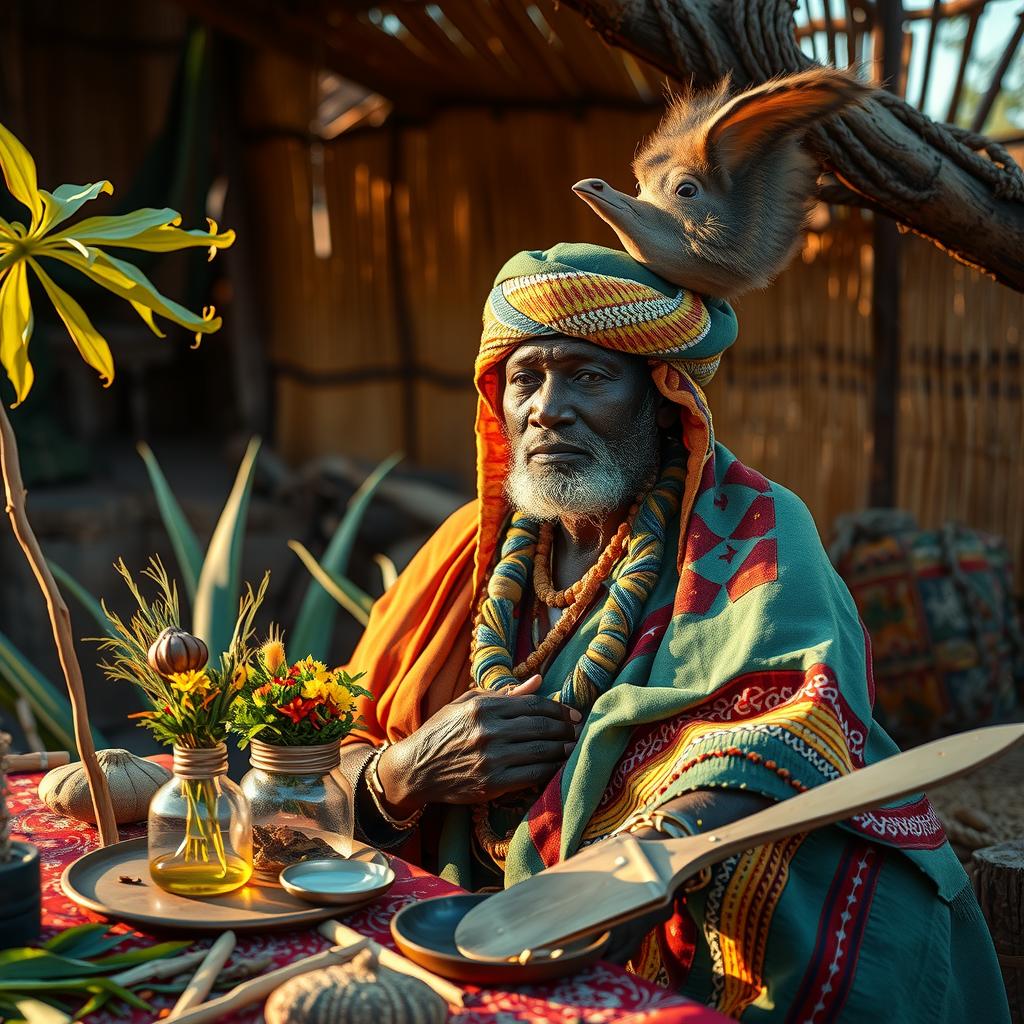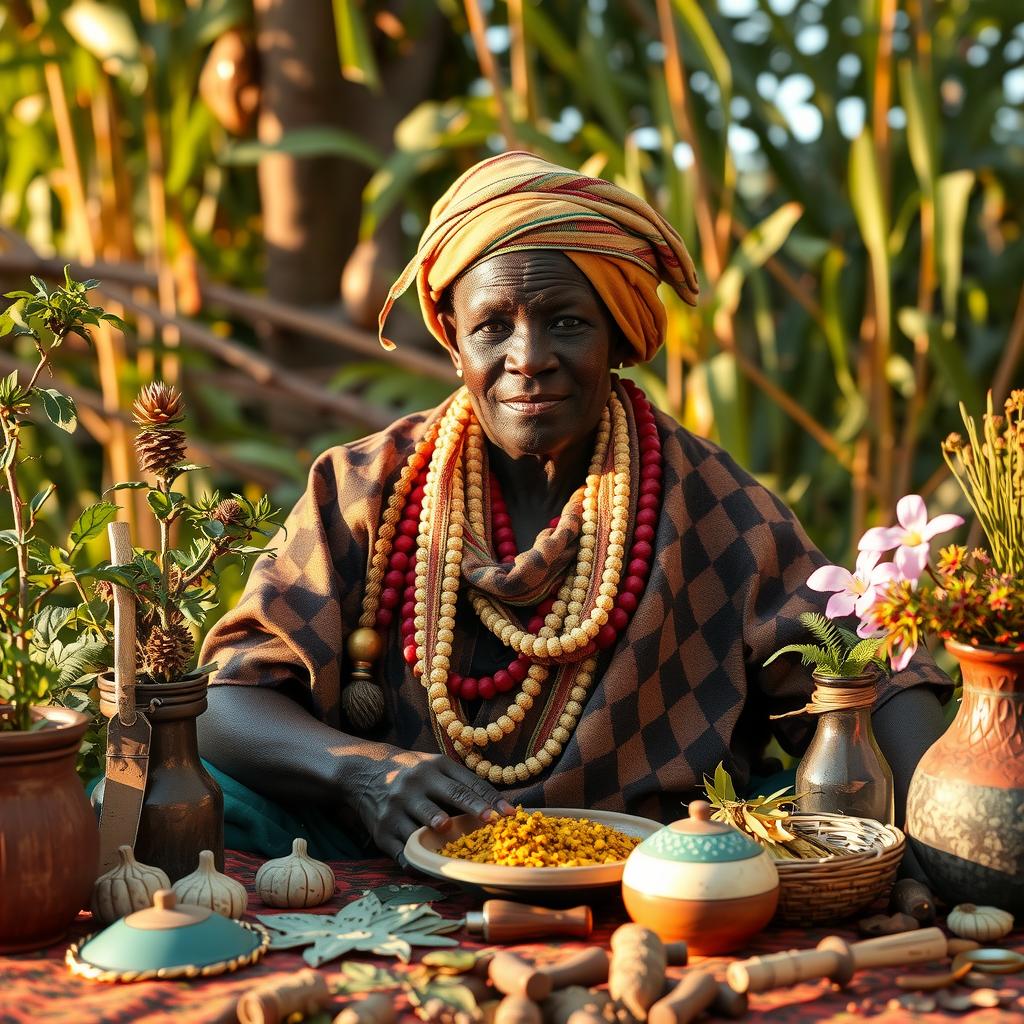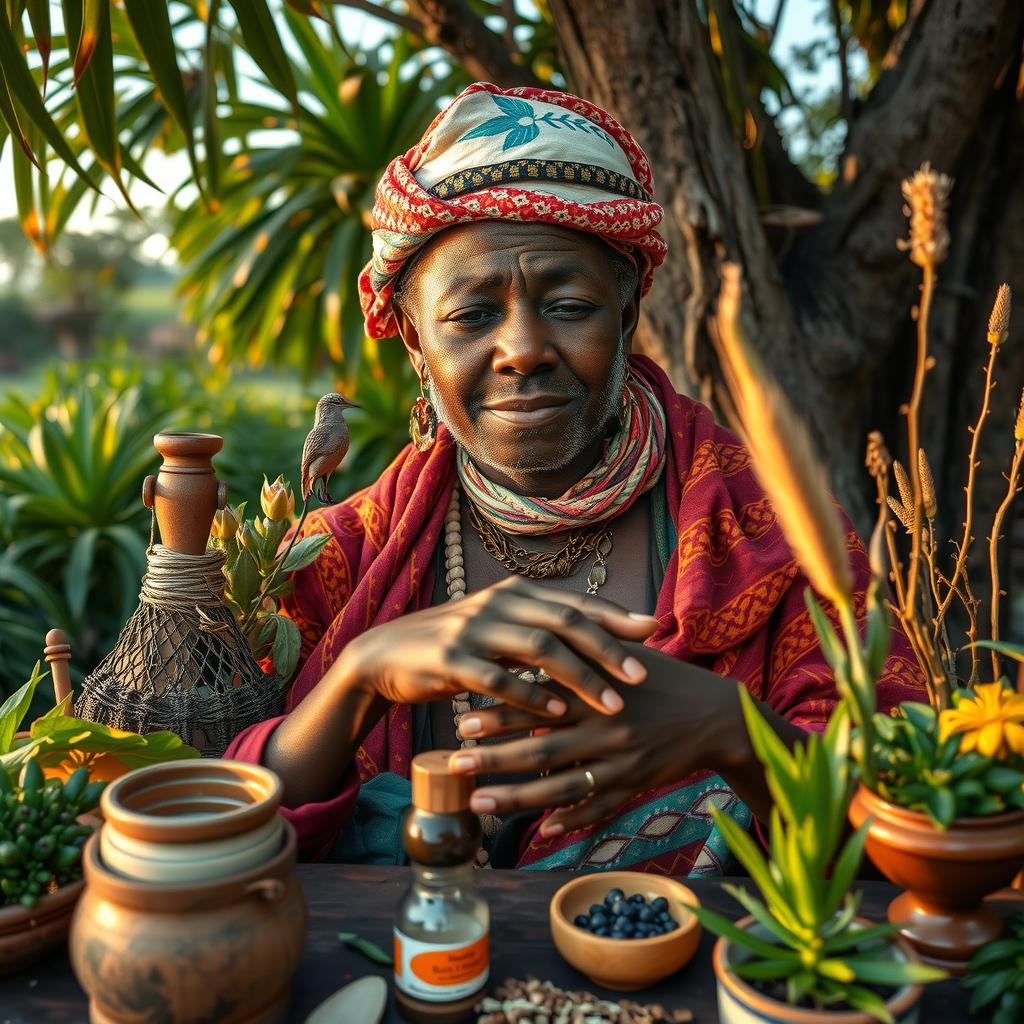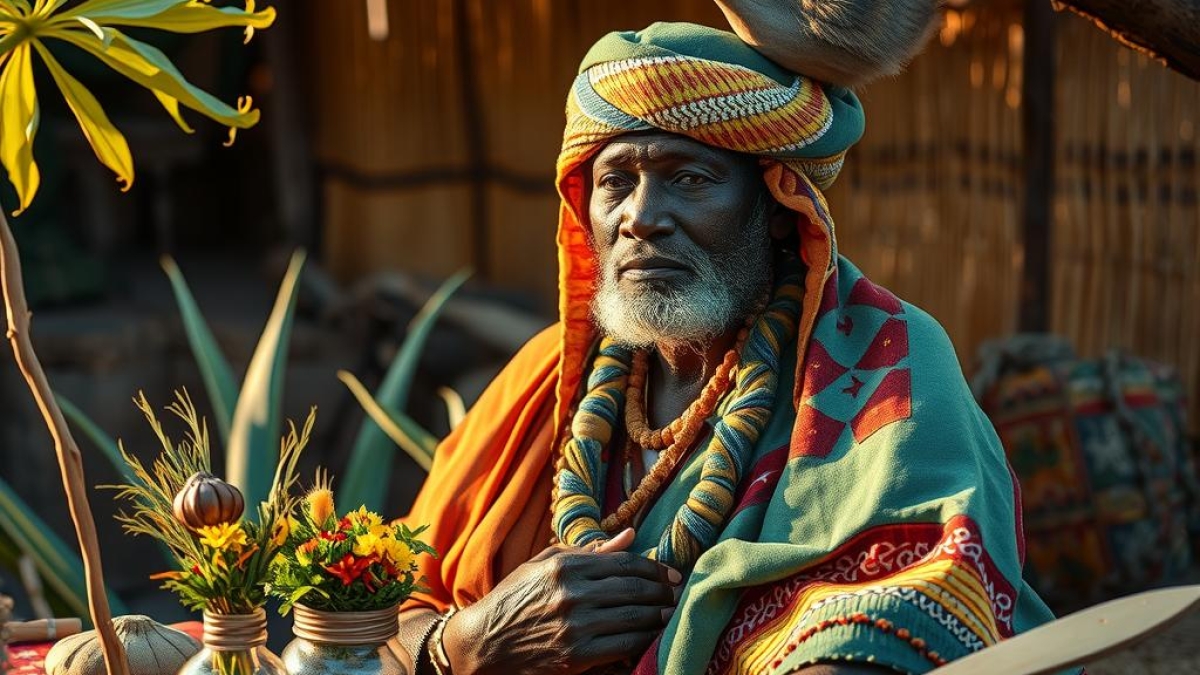In the rich tapestry of global health practices, Traditional African Medicine stands out as a profound embodiment of ancestral healing wisdom that has been passed down through generations. Rooted deeply in the diverse cultures across the continent, this system encompasses various herbalism practices, spiritual healing techniques, and holistic approaches to well-being that reflect a unique understanding of the human body and its connection to nature. The significance of Traditional African Medicine cannot be overstated; it offers insights into how ancient practices continue to influence modern health paradigms while providing sustainable alternatives for those seeking natural remedies.
Across Africa, traditional healing practices are not merely about physical ailments; they encompass a broader spectrum that includes emotional and spiritual dimensions. Practitioners often employ intricate methods such as divination techniques to diagnose illnesses or underlying issues affecting their patients. This is where Traditional African Medicine shines—melding spirituality with practical wellness strategies rooted in centuries-old traditions. By integrating these beliefs with treatment plans, healers foster an environment conducive to comprehensive recovery, emphasizing the importance of balance within one’s life.
Furthermore, herbalism plays a crucial role in many communities’ cultural wellness systems, showcasing how plants possess inherent properties beneficial for health maintenance and disease prevention. The use of native flora in Traditional African Medicine illustrates not only botanical knowledge but also a deep respect for nature’s gifts—a principle echoed throughout various African cultures’ health traditions. These natural remedies have been utilized effectively over millennia and highlight an evolving dialogue between tradition and contemporary medical practice.
As awareness grows globally regarding alternative healthcare solutions, there is renewed interest in exploring the depths of Traditional African Medicine. This exploration reveals much about resilience rooted in community knowledge systems that prioritize collective well-being alongside individual care. It demonstrates how these age-old methodologies can coexist with modern medicine while offering invaluable lessons on sustainability and harmony within one’s environment.
Recognizing the complexity and richness embedded within this form of healing encourages individuals from all backgrounds to engage with its principles thoughtfully. Whether one seeks insight into personal health challenges or aims to understand broader societal implications surrounding wellness frameworks worldwide—embracing *traditional healing practices, holistic approaches,_and natural remedies in Africa presents opportunities for transformative experiences grounded firmly within time-honored traditions.

Key Points:
-
Title of the key point: Examination of Traditional Healing Practices
The study of Traditional African Medicine involves a comprehensive examination of various healing practices that have been passed down through generations. These include herbalism practices, which utilize indigenous plants and natural remedies in Africa to treat ailments, and highlight the importance placed on local flora in these cultures. The integration of these practices into modern healthcare offers valuable insights into holistic health approaches that prioritize both physical and spiritual well-being. -
Title of the key point: Spiritual Healing Techniques
A significant aspect of Traditional African Medicine is its emphasis on spiritual healing techniques. Many African cultures health traditions view illness not just as a physical ailment but also as an imbalance within one’s spirit or community. Healers often perform rituals that involve prayer, meditation, or other forms of ancestral healing wisdom to restore harmony among individuals and their surroundings. This holistic perspective underscores the interconnectedness between mind, body, and spirit in achieving optimal health. -
Title of the key point: Divination Methods for Health Insights
In exploring Traditional African Medicine, one cannot overlook the role played by divination methods in diagnosing health issues. Various cultures employ systems where healers interpret signs from nature or engage with spiritual ancestors to gain insights about a person’s condition. These methods serve as tools for understanding underlying causes rather than merely addressing symptoms, reinforcing the cultural wellness systems inherent within traditional healing practices across diverse African societies. By recognizing these methodologies, contemporary medicine can enrich its diagnostic capabilities with valuable cultural context.

Exploring the Foundations of Traditional African Medicine
An In-Depth Look at Healing Practices Rooted in Ancestral Wisdom
The Traditional African Medicine system embodies a rich tapestry of health practices, deeply embedded within the cultural and spiritual frameworks of various African societies. These healing methods are not merely remedies for physical ailments but represent holistic approaches to wellness that integrate mind, body, and spirit. At the core of this tradition lies an understanding that health is a balance influenced by social, spiritual, and environmental factors. Practitioners often harness their community’s ancestral healing wisdom to diagnose illnesses through comprehensive assessments that consider emotional states and social dynamics alongside physical symptoms.
Herbalism practices play a pivotal role within Traditional African Medicine, utilizing indigenous plants known for their medicinal properties. Knowledge passed down through generations informs healers about which natural remedies in Africa are effective against specific ailments, ranging from common colds to more complex conditions like diabetes or hypertension. This extensive knowledge base reflects an intimate connection with nature; many practitioners engage in sustainable harvesting techniques to ensure these valuable resources remain available for future generations.
Furthermore, spirituality intertwines seamlessly with healthcare in many African cultures’ health traditions. Spiritual healing techniques such as prayer, rituals, and offerings serve as integral components of treatment plans designed by traditional healers. These methods often work alongside herbal treatments to address not just the physical manifestation of illness but also its spiritual roots—recognizing that disturbances in one’s spirit can lead to bodily afflictions. The belief systems surrounding these practices significantly shape how individuals perceive health and illness within their communities.
In addition to herbalism and spirituality, divination methods stand out as critical elements within Traditional African Medicine frameworks. Healers frequently employ divination tools—such as cowrie shells or bones—to gain insight into patients’ conditions or identify underlying causes of distress beyond what may be visible on the surface level. This practice underscores a broader comprehension among practitioners regarding mental well-being’s role in overall health—a concept gaining traction globally but long embraced by those who adhere strictly to traditional healing practices.
Ultimately, it is vital for contemporary society to acknowledge these diverse cultural wellness systems rooted deeply within Africa’s historical context while respecting them as valid alternatives or complements to Western medicine paradigms. By exploring Traditional African Medicine, individuals can glean insights into innovative approaches toward achieving holistic health that honor both ancestral knowledge and modern scientific inquiry alike—a testament that true wellness encompasses far more than mere absence from disease.

The Roots of Healing: Exploring Herbalism in African Cultures
Understanding the Foundation of Traditional African Medicine
Herbalism plays a pivotal role in Traditional African Medicine, serving as a cornerstone for health practices across numerous communities on the continent. For centuries, various ethnic groups have harnessed the healing properties of indigenous plants, integrating them into their cultural beliefs and practices. This unique blend of herbalism practices and spirituality forms an essential part of African cultures’ health traditions. In many regions, local healers or herbalists are revered figures who possess extensive knowledge about medicinal plants and their applications. These practitioners not only supply remedies but also engage with patients through spiritual healing techniques that recognize the interconnectedness between body, mind, and spirit—hallmarks of a holistic health approach.
Communities often view illness as an imbalance requiring restoration rather than merely a physical ailment to be treated. This perspective aligns closely with ancestral healing wisdom passed down through generations. Many traditional remedies consist of concoctions made from roots, leaves, seeds, and bark—which are believed to possess innate properties that address specific ailments ranging from digestive issues to chronic diseases. Furthermore, these natural therapies are frequently complemented by divination methods, where healers seek guidance on treatment paths tailored to individual needs.
The Significance of Medicinal Plants
Connecting Nature’s Pharmacy to Cultural Identity
The significance of medicinal plants within Traditional African Medicine extends beyond mere treatment; it is deeply intertwined with cultural identity and community well-being. Each plant carries symbolic value steeped in historical narratives that reinforce communal ties among individuals practicing these ancient arts. Knowledge surrounding the preparation and application of these herbs is often communal property shared during gatherings or ceremonies—a practice that fosters unity while preserving critical aspects of cultural heritage.
Incorporating natural remedies in Africa into daily life reflects not just physical reliance on nature but also spiritual reverence for it; thus embodying core values inherent in many societies across Africa today. Within this framework exists a sophisticated understanding encapsulated by holistic approaches towards wellness—where emotional stability complements physiological health as outlined by traditional healing practices. While modern medicine has begun encroaching upon these age-old customs—often viewed skeptically due to perceived inefficacies—the efficacy demonstrated by countless generations lends credence to such methodologies.
Moreover, contemporary science increasingly validates claims regarding the pharmacological properties found within select flora utilized traditionally throughout Africa; research continuously uncovers new compounds exhibiting therapeutic potential derived directly from nature’s pharmacy.
Bridging Tradition with Modernity
A New Era for Health Practices Inspired by Ancestral Wisdom
As global interest surges around alternative treatments inspired by models like Traditional African Medicine, there emerges an opportunity for integration between time-honored traditions and contemporary medical frameworks aimed at enhancing public healthcare systems worldwide while respecting local contexts rooted deeply within diverse populations’ realities.
Significantly influenced by globalization trends alongside increased awareness regarding environmental sustainability concerns emerges dialogue emphasizing collaboration among Western-trained medical professionals alongside traditional healers committed towards synergizing best-practice methodologies inclusive yet respectful towards each other’s inputs without undermining established norms arising from distinct backgrounds involving complex historical narratives shaped over millennia focusing primarily upon human experiences subjected inevitably under varying socio-economic pressures impacting access levels available toward quality care options delivered efficiently addressing disparities existing globally today necessitated urgently amidst ongoing crises linked largely back onto inequitable distribution patterns inhibiting optimal outcomes achieved ultimately no matter how advanced technologies become without ensuring equitable provision remains foundational priority recognized universally moving forward diligently working together harmoniously bridging gaps previously divided separating diverse modalities practiced effectively respecting those distinctions inherent observed authentically reflecting respective heritages celebrated proudly therein reinforcing dignity empowerment fostering resilience against adversity encountered along journeys undertaken collectively striving upwards toward better futures envisioned ahead inspiring hope perseverance thriving inclusively thereby paving pathways unlocking untold potentials awaiting discovery evermore enriching lives lived fully grounded deeply rooted essence honoring legacies left behind illuminating brighter tomorrows unfolding endlessly along horizons stretching wide inviting all partake actively join conversations shaping futures anew weaving tapestries woven intricately connecting hearts minds souls alike united sharing gifts bestowed generously unto humanity itself transcending boundaries forging bonds stronger enduring forever intertwining destinies intertwined beautifully together uplifting spirits soaring high reaching heights unexplored before now beckoning forth visions brighter illuminating possibilities infinite boundless limitless transcendent embracing wholeness wholly embodied timelessly cherished eternally loved nurtured tenderly cradled gently embraced warmly holding close safely always nearby guiding light leading onward shining bright illuminating way ahead boldly forging pathways radiant filled joy love peace harmony grace unity diversity beauty wonder awe inspiration flourishing brightly blossoming magnificently awakening dreams long held dear ushering forth transformations monumental historically profound shifting paradigms radically redefining standards expectations perceived so far casting shadows fading past remnants finally giving rise fresh beginnings emerging triumphantly rejuvenated revitalized renewed commitment advancing forward courageously steadfast resolute unwavering determined never yielding facing challenges bravely rallying strength drawing energy replenishing resources flowing abundantly nurturing growth wherever planted flourishing vividly brimming vibrant colors dazzling brilliance resounding
The Interconnection of Mind, Body, and Spirit in Healing
Exploring Spirituality’s Role in Holistic Health Approaches
The integration of spirituality into holistic health practices is a fundamental aspect that underscores the importance of connecting mind, body, and spirit. In many African cultures’ health traditions, such as those found within Traditional African Medicine, spirituality is seen not as an isolated component but as a vital thread woven into the fabric of overall well-being. This approach emphasizes that true healing cannot occur without addressing spiritual needs alongside physical ailments. Ancestral healing wisdom plays a pivotal role here; it encompasses various spiritual healing techniques rooted in long-standing cultural beliefs and practices. These methods often include rituals or ceremonies aimed at restoring balance between the individual’s inner self and their external environment.
Moreover, practitioners often utilize divination methods to gain insights into underlying issues affecting an individual’s health. For instance, diviners may interpret dreams or read patterns from natural elements to help identify spiritual blockages or emotional disturbances manifesting physically. This intricate relationship highlights how holistic approaches are viewed through the lens of interconnectedness — recognizing that mental clarity can enhance physical vitality while fostering spiritual growth contributes to emotional resilience.
Herbalism Practices: Nature’s Gift for Well-Being
In addition to spirituality’s influence on health outcomes, herbalism practices form another cornerstone of holistic care within Traditional African Medicine. Utilizing nature’s bounty offers profound opportunities for individuals seeking natural remedies in Africa that resonate with both their bodies and spirits. Many traditional healers draw upon centuries-old knowledge passed down through generations by employing specific plants known for their medicinal properties along with symbolic meanings deeply ingrained in local cultures.
This intertwining of botany with cultural wellness systems signifies more than just treating symptoms; it embodies respect for ancestral connections and understanding one’s place within community dynamics when using herbs therapeutically. By integrating these natural remedies with other aspects like meditation or prayerful reflection—hallmarks found across various African cultures’ health traditions—the comprehensive impact becomes evident: patients experience relief not only from physical discomfort but also achieve greater harmony among themselves spiritually.
The Efficacy of Traditional Healing Practices
The efficacy inherent in traditional healing practices lies largely within their ability to address multiple aspects impacting human existence simultaneously—a principle championed by proponents advocating for a more expansive view toward healthcare solutions today compared against conventional paradigms focused primarily on symptom relief alone. Within this context emerges an appreciation for how spiritual healing techniques, herbalism practices, alongside effective communication fostered during consultations build trust between patient-practitioner relationships essential towards enabling recovery processes effectively.
As people increasingly seek alternatives beyond mainstream medicine due partially due societal shifts promoting mindfulness lifestyles throughout modern society—the resurgence towards embracing age-old methodologies reflects growing awareness around personal agency over one’s own wellbeing choices while ensuring alignment values held dear by communities served via inclusive frameworks rooted deeply inside historical contexts surrounding traditional african medicine itself remains relevant even amidst rapid change experienced globally today without losing sight what truly matters most: achieving balance among mind-body-spirit triad central life experience each person navigates daily journey traversing world filled complexities encountered daily interactions lived out collectively shared amongst unique narratives interwoven together tapestry humanity itself unfolds continuously over time.
Frequently Asked Questions:
Q: What are the core elements of Traditional African Medicine?
A: The core elements of Traditional African Medicine include a diverse array of practices such as herbalism, spiritual healing techniques, and divination methods. These practices draw upon ancestral healing wisdom that has been passed down through generations in various African cultures. Herbalism practices often utilize locally sourced plants and natural remedies in Africa to treat ailments, while spiritual healing incorporates rituals and beliefs aimed at restoring balance within individuals.
Q: How does Traditional African Medicine promote a holistic health approach?
A: Traditional African Medicine emphasizes a holistic health approach by considering the physical, emotional, and spiritual well-being of an individual. This perspective aligns with the cultural wellness systems found across different African cultures’ health traditions, which view health as interconnected with community and environmental factors. Traditional healing practices often involve not only addressing symptoms but also understanding underlying causes through consultations that may include divination methods to gain deeper insights into a person’s life circumstances.
Q: In what ways can modern medicine benefit from incorporating aspects of Traditional African Medicine?
A: Modern medicine can benefit significantly by integrating aspects of Traditional African Medicine, particularly its emphasis on preventive care and the use of natural remedies in Africa. By recognizing the value of herbalism practices alongside conventional treatments, healthcare providers can create more comprehensive treatment plans that respect patients’ cultural backgrounds. Additionally, understanding spiritual healing techniques may enhance patient care by addressing psychological needs through culturally relevant means, ultimately fostering greater trust between healthcare professionals and communities rooted in traditional values.

Add a Comment